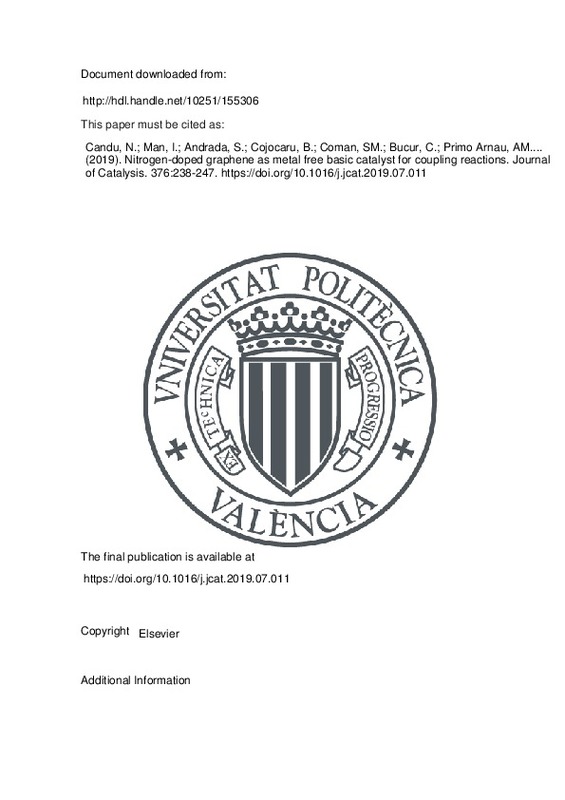JavaScript is disabled for your browser. Some features of this site may not work without it.
Buscar en RiuNet
Listar
Mi cuenta
Estadísticas
Ayuda RiuNet
Admin. UPV
Nitrogen-doped graphene as metal free basic catalyst for coupling reactions
Mostrar el registro sencillo del ítem
Ficheros en el ítem
| dc.contributor.author | Candu, Natalia
|
es_ES |
| dc.contributor.author | Man, Isabella
|
es_ES |
| dc.contributor.author | Andrada, Simion
|
es_ES |
| dc.contributor.author | COJOCARU, BOGDAN
|
es_ES |
| dc.contributor.author | Coman, Simona M.
|
es_ES |
| dc.contributor.author | Bucur, C.
|
es_ES |
| dc.contributor.author | Primo Arnau, Ana Maria
|
es_ES |
| dc.contributor.author | García Gómez, Hermenegildo
|
es_ES |
| dc.contributor.author | PARVULESCU, VASILE I.
|
es_ES |
| dc.date.accessioned | 2020-11-19T04:32:11Z | |
| dc.date.available | 2020-11-19T04:32:11Z | |
| dc.date.issued | 2019-08 | es_ES |
| dc.identifier.issn | 0021-9517 | es_ES |
| dc.identifier.uri | http://hdl.handle.net/10251/155306 | |
| dc.description.abstract | [EN] N-doped defective graphene [(N)G] obtained by pyrolysis at 900 degrees C of chitosan contains about 3.7% of residual N atoms, distributed as pyridinic, pyrrolic and graphitic N atoms. It has been found that (N)G acts as basic catalyst promoting two classical C-C bond forming nucleophilic additions in organic chemistry, such as the Michael and the Henry additions. Computational calculations at DFT level of models corresponding to the various N atoms leads to the conclusion that N atoms are more stable at the periphery of the graphene sheets and that H adsorption on these sites is a suitable descriptor to correlate with the catalytic activity of the various sites. According to these calculations the most active sites are pyridinic N atoms at zig-zag edges of the sheets. In addition, N as dopant changes the reactivity of the neigh. bour C atoms. Water was found a suitable solvent to achieve high conversions in both reactions. In this solvent the initial distribution of N atoms is affected due to the easy protonation of the N-py to N-pyH sites. As an effect, C edge sites adjacent at N-PyH with an appropriate reactivity towards the alpha-C-H bond breaking are formed. The present results show the general activity of N-doped graphene as base catalysts and illustrate the potential of carbocatalysis to promote reactions of general interest in organic synthesis. (C) 2019 Elsevier Inc. All rights reserved. | es_ES |
| dc.description.sponsorship | This work was supported by UEFISCDI (PN-III-P4-ID-PCE-2016-0146. nr. 121/2017 and project number PN-III-P1-1.1-TE-2016-2191. nr. 89/2018). Financial support by the Spanish Ministry of Economy and Competitiveness (Severo Ochoa and CTQ2015-69653-CO2-R1) and Generalitat Valenciana (Prometeo 2017-083) is gratefully acknowledged. A.P thanks the Spanish Ministry of Science and Innovation for a Ramon y Cajal research associate contract. | es_ES |
| dc.language | Inglés | es_ES |
| dc.publisher | Elsevier | es_ES |
| dc.relation | MINECO/CTQ2015-69653-CO2-R1 | es_ES |
| dc.relation.ispartof | Journal of Catalysis | es_ES |
| dc.rights | Reconocimiento - No comercial - Sin obra derivada (by-nc-nd) | es_ES |
| dc.subject | Graphene | es_ES |
| dc.subject | Nitrogen doped graphene | es_ES |
| dc.subject | Michael reaction | es_ES |
| dc.subject | Henry reaction | es_ES |
| dc.subject | Density functional theory | es_ES |
| dc.subject | Adsorption energy | es_ES |
| dc.subject.classification | QUIMICA ORGANICA | es_ES |
| dc.title | Nitrogen-doped graphene as metal free basic catalyst for coupling reactions | es_ES |
| dc.type | Artículo | es_ES |
| dc.identifier.doi | 10.1016/j.jcat.2019.07.011 | es_ES |
| dc.relation.projectID | info:eu-repo/grantAgreement/UEFISCDI//PN-III-P4-ID-PCE-2016-0146 121%2F2017/ | es_ES |
| dc.relation.projectID | info:eu-repo/grantAgreement/UEFISCDI//PN-III-P1-1.1-TE-2016-2191 89%2F2018/ | es_ES |
| dc.relation.projectID | info:eu-repo/grantAgreement/GVA//PROMETEO%2F2017%2F083/ | es_ES |
| dc.rights.accessRights | Abierto | es_ES |
| dc.contributor.affiliation | Universitat Politècnica de València. Departamento de Química - Departament de Química | es_ES |
| dc.description.bibliographicCitation | Candu, N.; Man, I.; Andrada, S.; Cojocaru, B.; Coman, SM.; Bucur, C.; Primo Arnau, AM.... (2019). Nitrogen-doped graphene as metal free basic catalyst for coupling reactions. Journal of Catalysis. 376:238-247. https://doi.org/10.1016/j.jcat.2019.07.011 | es_ES |
| dc.description.accrualMethod | S | es_ES |
| dc.relation.publisherversion | https://doi.org/10.1016/j.jcat.2019.07.011 | es_ES |
| dc.description.upvformatpinicio | 238 | es_ES |
| dc.description.upvformatpfin | 247 | es_ES |
| dc.type.version | info:eu-repo/semantics/publishedVersion | es_ES |
| dc.description.volume | 376 | es_ES |
| dc.relation.pasarela | S\407295 | es_ES |
| dc.contributor.funder | Generalitat Valenciana | es_ES |
| dc.contributor.funder | Ministerio de Economía y Competitividad | es_ES |
| dc.contributor.funder | Ministerio de Ciencia, Innovación y Universidades | es_ES |
| dc.contributor.funder | Executive Agency for Higher Education, Scientific Research, Development and Innovation Funding, Rumanía | es_ES |







![[Cerrado]](/themes/UPV/images/candado.png)

